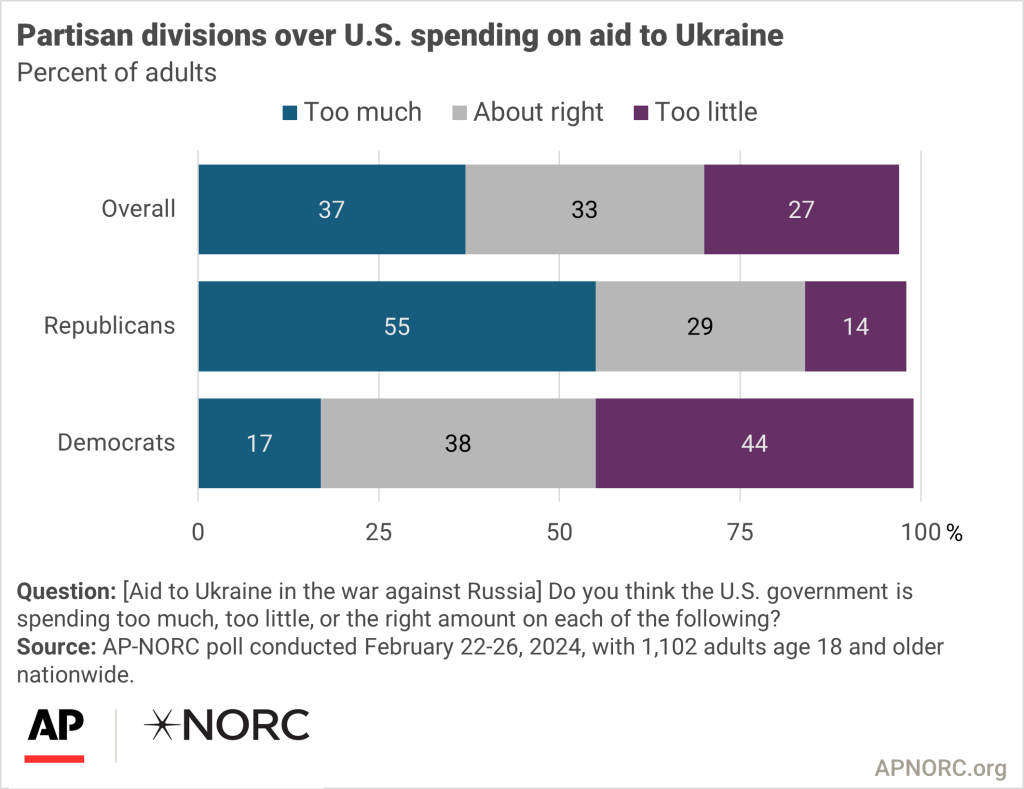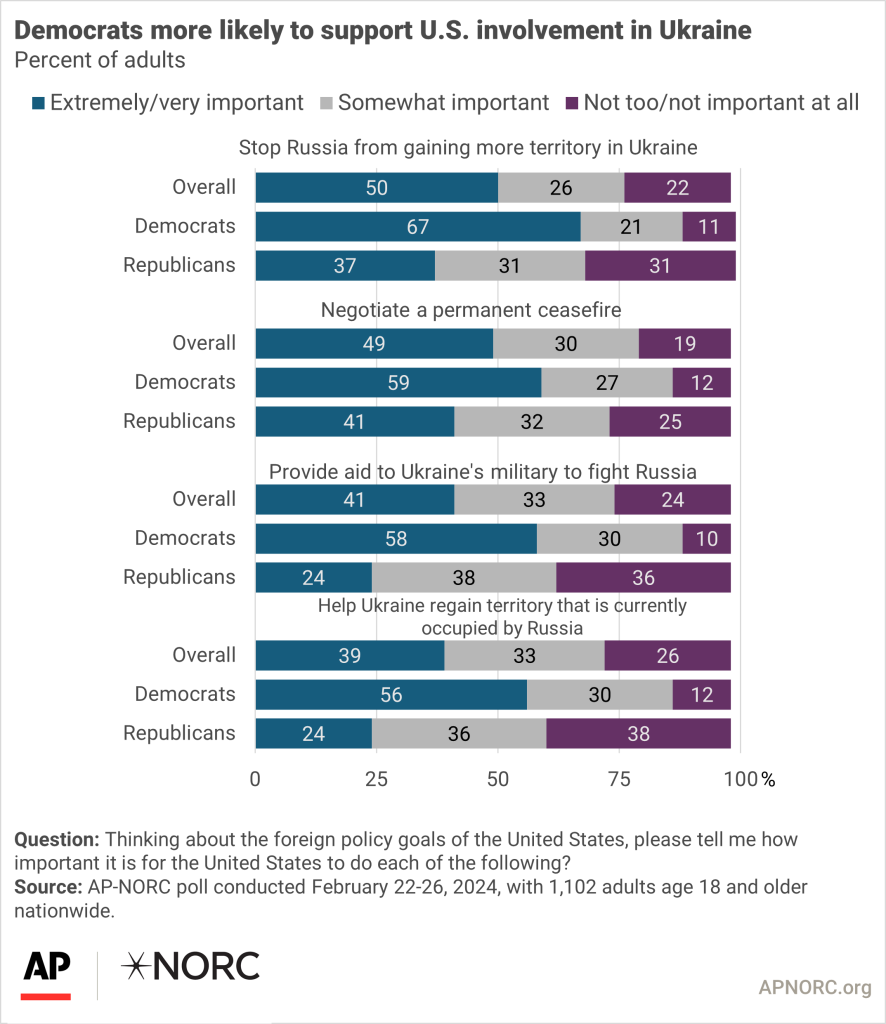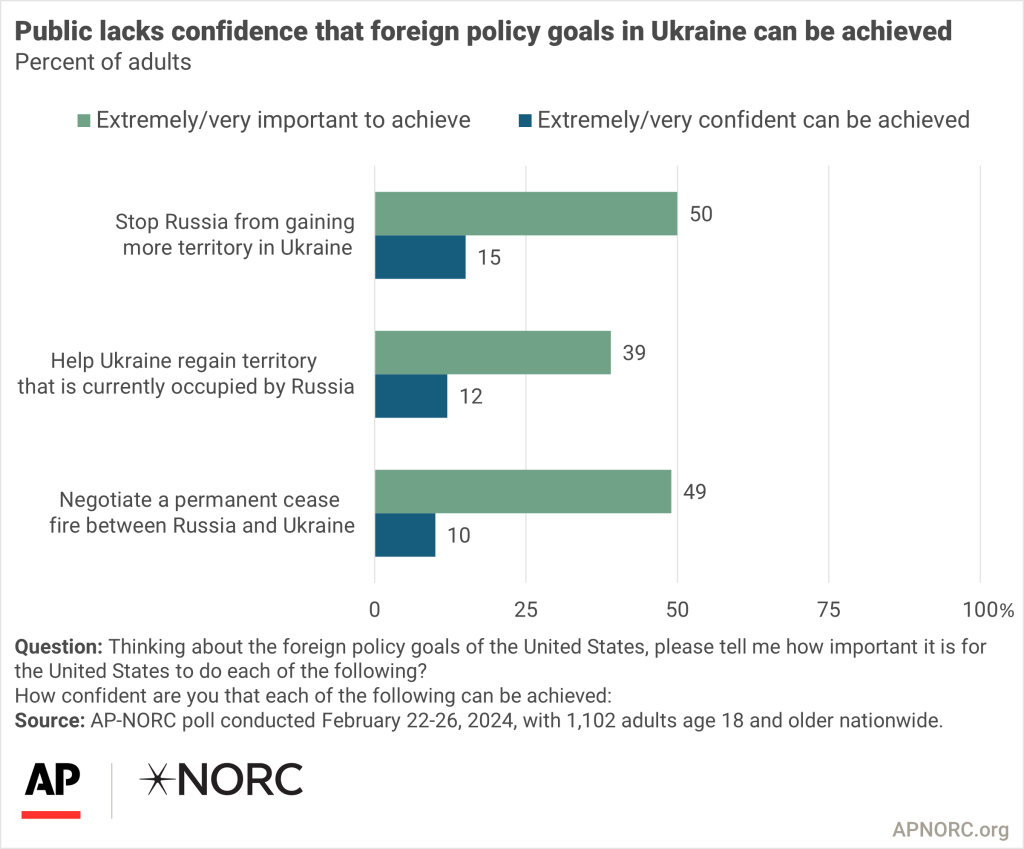
February 29, 2024
Two years after Russia’s invasion of Ukraine on February 24, 2022, Congress is divided over continuing aid to help Ukraine in its war against Russia. The public is also split along party lines.
Overall, 4 in 10 adults think the U.S. government is spending too much on aid to Ukraine. Three in ten say they are spending too little and a third think the amount is about right. Roughly half of Republicans (55%) think the government is spending too much money on military aid to Ukraine whereas 44% of Democrats think the government is spending too little.

Support for sanctions on Russia has remained steady. Last November, 63% supported economic sanctions on Russia. Today, 63% support such sanctions. Democrats are more likely to support sanctions (74%) than Republicans (52%). Four in ten adults support accepting Ukrainian refugees into the United States. Democrats are also more likely to support accepting Ukrainian refugees (61%) than Republicans (27%).
Foreign policy on the Russia-Ukraine war has become a partisan dividing line. Most Democrats see it as a priority for the U.S. government to prevent Russia from gaining more territory in Ukraine and to help Ukraine regain territory that is currently occupied by Russia. Less than half of Republicans agree.

At the two-year anniversary of Russia’s invasion, the public’s outlook on the outcomes of the war is pessimistic. Only 13% are extremely or very confident that Ukraine can win the war against Russia. Another 36% are somewhat confident and 49% are not too or not at all confident.
While many agree with the foreign policy goals of the United States regarding the conflict, few, regardless of party identification, are extremely or very confident about any positive results. Twenty-two percent say the United States should take a more involved role in the war between Russia and Ukraine, while 36% say it should have a less active role, and 40% think the United States involvement is at about the right level.

About a third of adults (35%) are concerned that the war between Russia and Ukraine will lead to a bigger conflict in Europe. Forty percent are worried that the United States will be drawn into a war with Russia. Democrats and Republicans have similar concerns about the possibility of broader conflicts.
Sixty-one percent of adults think being part of NATO, the military alliance between the United States, Canada, and many European countries, is good for the United States. This is similar to the 65% who said the same in April 2022, shortly after the war began. Democrats are more likely to support NATO membership (78%) than Republicans (50%).
Fifty-six percent of adults would support deploying U.S. troops to defend a NATO ally if it was attacked by Russia, which falls under Article V in the NATO military alliance. Despite former President Trump’s remarks last week that he would not defend a NATO ally if it failed to meet defense spending targets, about half of Republicans support sending troops to defend a NATO ally if attacked by Russia.

Seventy-nine percent of adults have an unfavorable opinion of Vladimir Putin, who received international criticism last week after the death of political opponent Alexei Navalny in an Arctic penal colony. Although few in either party are favorable, Republicans are more likely to have a favorable opinion (14%) than Democrats (3%).
Volodymyr Zelenskyy is viewed more positively – 43% of adults have a favorable opinion, 22% unfavorable, and 35% don’t know enough about him to say. These opinions are divided by partisanship. Sixty-two percent of Democrats have a favorable opinion of the Ukrainian leader compared with 32% of Republicans.
The nationwide poll was conducted February 22-26, 2024 using the AmeriSpeak® Panel, the probability-based panel of NORC at the University of Chicago. Online and telephone interviews using landlines and cell phones were conducted with 1,102 adults. The margin of sampling error is +/- 4.1 percentage points.







